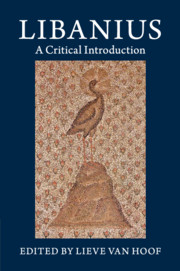Book contents
- Frontmatter
- Dedication
- Contents
- List of tables
- Notes on contributors
- Preface
- Abbreviations
- Introduction: Libanius at the margins
- Part I Reading Libanius
- Part II Libanius’ texts: rhetoric, self-presentation and reception
- Chapter 4 Libanius’ Orations
- Chapter 5 Libanius’ Declamations
- Chapter 6 Libanius’ Progymnasmata
- Chapter 7 Libanius’ Letters
- Chapter 8 The reception of Libanius: from pagan friend of Julian to (almost) Christian saint and back
- Part III Contexts: identity, society, tradition
- Appendices: survey of Libanius’ works and of available translations
- References
- Index locorum
- General index
Chapter 8 - The reception of Libanius: from pagan friend of Julian to (almost) Christian saint and back
from Part II - Libanius’ texts: rhetoric, self-presentation and reception
Published online by Cambridge University Press: 05 October 2014
- Frontmatter
- Dedication
- Contents
- List of tables
- Notes on contributors
- Preface
- Abbreviations
- Introduction: Libanius at the margins
- Part I Reading Libanius
- Part II Libanius’ texts: rhetoric, self-presentation and reception
- Chapter 4 Libanius’ Orations
- Chapter 5 Libanius’ Declamations
- Chapter 6 Libanius’ Progymnasmata
- Chapter 7 Libanius’ Letters
- Chapter 8 The reception of Libanius: from pagan friend of Julian to (almost) Christian saint and back
- Part III Contexts: identity, society, tradition
- Appendices: survey of Libanius’ works and of available translations
- References
- Index locorum
- General index
Summary
Preparing for posterity
This chapter is concerned with the reception of Libanius. If it has its place in Part II of this volume, dedicated to the works of Libanius, and not, as is often the case in books concerning ancient authors, in a separate part about the author’s Nachleben placed at the end of the volume, this is because the fascinating story of the reception of Libanius starts, in an important sense, with Libanius himself. Indeed, a striking red thread that runs through the preceding chapters of this volume is Libanius’ overarching concern for his self-presentation. The most obvious text that comes to mind in this respect is the Autobiography, which Libanius kept reworking during almost two decades and with which he explicitly sought to shape and reshape the image he would leave behind. An equally strong concern for his public image lies behind the various orations which he held about himself, his school and his public role. What is more: several orations that deal with topics seemingly unrelated to Libanius as a person seem to have been inspired by very similar concerns. As was pointed out in Chapter 4, for example, Libanius composed his speeches on the riot of the statues (Orations 19–23) after the facts, their main aim thus being not so much to influence the actual course of events as to show off the full range of his rhetorical abilities, perhaps in competition with John Chrysostom, and to suggest his influence on the emperor Theodosius.
More generally, of course, the public performance of an oration or a declamation always affected the public image of the performer, whether his honour be increased by an exceptional success in a rhetorical competition or diminished by a (below-)average performance. Libanius indeed reveals himself to take pride in public shows of approval for his speeches. In Oration 3.14, for example, he reproaches his students for not showing any enthusiasm for his speeches, and in particular for ‘spoiling genuine applause with the slow hand-clap’.
- Type
- Chapter
- Information
- LibaniusA Critical Introduction, pp. 160 - 184Publisher: Cambridge University PressPrint publication year: 2014



